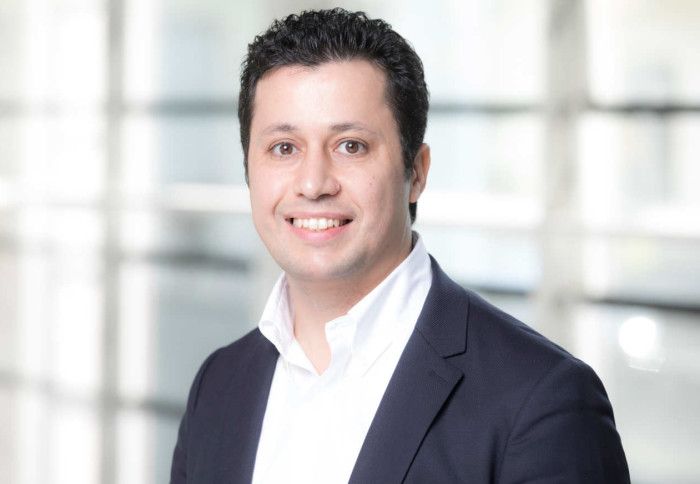Celebrating EEE staff promotions: Professor Pantelis Georgiou
by Jane Horrell

Pantelis is looking to inspire the next generation of Biomedical Engineers
Six of our academic staff have been promoted in this year's round. Today we meet Professor Pantelis Georgiou.
Pantelis Georgiou, promoted to Professor of Biomedical Electronics
"As an Electronic Engineer, I have always been excited about working between the disciplines of Engineering and Medicine to invent new technologies to address our current healthcare challenges. That is why when I was appointed as a Lecturer within the Circuits and Systems group of the Department of Electrical and Electronic Engineering in 2011, my vision was to create next generation medical devices through innovations in bio-inspired microelectronic technology. I am the Director of the Bio-inspired Metabolic and Infection technology lab, within the Centre for Bio-inspired Technology, where I lead a diverse team of multidisciplinary researchers ranging from microchip designers, electronic engineers, molecular biologists and clinicians. Bringing together these various disciplines in one vibrant place and setting a culture of innovation and collaboration has been key to our success in creating and translating new healthcare technologies.
My journey in this field started with the development of devices for management of Type 1 Diabetes, creating and clinically validating the world’s first bio-inspired artificial pancreas, a fully closed-loop system enabling real time measurement of glucose and insulin release using a bio-inspired microchip. More recently, I have had a core focus in creating new technologies for rapid detection of Infectious Diseases through innovations in microchip-based Lab-on-Chip systems. These enable the realisation of small portable devices with diagnostic utility as you would expect from a sophisticated lab, measuring with high sensitivity and specificity DNA and RNA related to an infection. They have been successfully deployed for detection of malaria, tuberculosis, bacterial resistant infections addressing Antimicrobial Resistance (AMR), and more recently have been repurposed to make a handheld molecular diagnostic test for COVID-19.
A lot of my diagnostics work is also targeted towards developing countries where it can have the most impact, as access to hospitals and advanced healthcare systems is limited, and we have ongoing programmes with collaborations in Africa, Thailand and Vietnam. Being an advocate for technology in infectious diseases, within Imperial College, I am the Chief Scientist of the Centre for Antimicrobial Optimisation and also the Faculty of Engineering Champion for our newly founded Institute of Infection, aiming to maximise the impact new technologies can have in this space."
INSTITUTE OF INFECTION SEMINAR: We are excited to continue our seminar series with Prof Pantelis Georgiou from @imperialeee, on Microchip Technology enabling Rapid Diagnostics of Infectious Diseases: From AMR to COVID-19.
Friday, 24 September | 1-2 pm. Register for the online seminar
"With a core background in microelectronics in the Department, I teach advanced courses on Analogue Integrated Circuit Design and I am the course director for our MSc in Analogue and Digital Integrated Circuit Design. My research always runs hand in hand with my teaching and interactions with our students has also been key, as I look to inspire the next generation of Biomedical Engineers. That is why I also introduced and lecture a course in Biomedical Electronics which gives our students the opportunity to gain expertise in this field. Outreach and societal engagement are also important for communicating and informing the public of the latest research and its impact, and with my group we have been very active in conducting several interactive demonstrations of our technologies at Imperial Festival and events hosted by the Science Museum, the Royal Institution and the UK parliament."
Our congratulations to Pantelis — and to all our staff on their recent promotions — from everyone in the EEE Community!
Article text (excluding photos or graphics) © Imperial College London.
Photos and graphics subject to third party copyright used with permission or © Imperial College London.
Reporter
Jane Horrell
Department of Electrical and Electronic Engineering